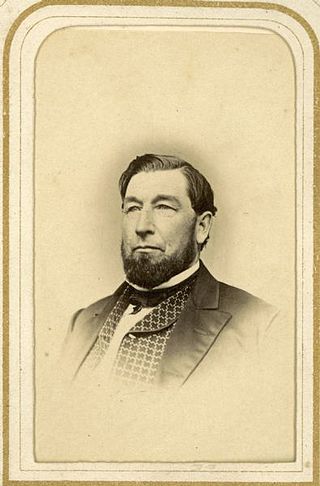
Janesville is a city in and the county seat of Rock County, Wisconsin, United States. As of the 2020 census, the city had a population of 65,615, making it the tenth-most populous city in Wisconsin. It is a principal municipality of the Janesville–Beloit metropolitan statistical area, which consists of all of Rock County and is included in the greater Madison–Janesville–Beloit combined statistical area.

Frances Elizabeth Caroline Willard was an American educator, temperance reformer, and women's suffragist. Willard became the national president of Woman's Christian Temperance Union (WCTU) in 1879 and remained president until her death in 1898. Her influence continued in the next decades, as the Eighteenth and Nineteenth Amendments to the United States Constitution were adopted. Willard developed the slogan "Do Everything" for the WCTU and encouraged members to engage in a broad array of social reforms by lobbying, petitioning, preaching, publishing, and education.

Samuel Dexter Hastings Sr. was an American businessman, politician, and Wisconsin pioneer. He was the 4th state treasurer of Wisconsin and served two years in the Wisconsin State Assembly.
Otis West Norton was an American businessman, politician, and Wisconsin pioneer. He served in the first three sessions of the Wisconsin State Senate, representing Rock County.
Riley N. Messenger was an American lawyer, teacher, and Wisconsin pioneer. He served as a Democratic member of the Wisconsin Senate during the 1st Wisconsin Legislature (1848). He later served in the Wisconsin State Assembly during the 1853 session.
John Moon Wells was an American farmer, teacher, and pioneer of Waukesha, Wisconsin. He served a single term in the Wisconsin State Assembly, representing Waukesha and New Berlin in the 1849 session. He was elected on the Free Soil Party ticket.
Parker Warren was an American farmer from Beaver Dam, Wisconsin who served a one-year term in 1849 as a Free Soil Party member of the Wisconsin State Assembly from Dodge County.

The Frances Willard Schoolhouse is a one-room schoolhouse built in 1853 in Janesville, Wisconsin. Prominent women's suffragist and social reformer Frances Willard studied and taught there. In 1977 the school was added to the National Register of Historic Places.
Joseph Spaulding was an American farmer from Rock County, Wisconsin, who spent two one-year terms as a member of the Wisconsin State Assembly from Rock County, first as a Freesoiler and later as a Republican.
Stephen Osander Bennett was an American merchant, farmer, and Free Soil politician. He was an early settler at Raymond, Wisconsin, and represented Racine County in the Wisconsin State Senate (1851–1852) and Assembly (1850).
Adam E. Ray was an American farmer politician from Troy, Wisconsin who served several terms in the Legislature of Wisconsin Territory, and a single term in 1851 as a Free Soil Party member of the Wisconsin State Assembly from Walworth County.
Samuel Pratt was an American farmer, Republican politician, and Wisconsin pioneer. He was an early settler at Spring Prairie, Wisconsin, and represented his region in the Wisconsin State Assembly and State Senate for nine sessions between 1849 and 1874.

Philo Dunning was an American merchant and druggist from Madison, Wisconsin, who held a number of local office, spent a single one-year term as a Reform Party member of the Wisconsin State Assembly from Dane County, and served on the state fisheries commission.
Lathrop Burgess was an American carpenter and farmer from Brighton, Wisconsin, who spent two one-year terms as a member of the Wisconsin State Assembly from Kenosha County; the first as a Freesoiler, the second as a Republican.
George F. A. Atherton was an American politician from Emerald Grove, Wisconsin, who served in the Wisconsin State Assembly after being elected to the 1st Wisconsin Legislature in 1848. He represented the Rock County towns of Bradford and Janesville.

Mary Thompson Hill Willard was an American teacher and social reformer. Her daughter, Frances Willard, was the founder and president of the World's Woman's Christian Temperance Union (W.C.T.U.) as well as president of the National W.C.T.U.
Henry Johnson was an American farmer, Republican politician, and Wisconsin pioneer. He was instrumental in the founding of the Wisconsin State Agricultural Society, and served two terms in the Wisconsin State Assembly, representing eastern Kenosha County. Earlier in his life, he was a member of the New York State Legislature.
Patrick Toland (1801–1858) was a farmer from Erin, Wisconsin who served a single one-year term as a Democratic member of the Wisconsin State Assembly from Washington County and held other public offices.
Charles Rickerson was a farmer from Medina, Wisconsin who served a single one-year term as a Democratic member of the Wisconsin State Assembly from Dane County for the 1849 session.
John Devine Seaver was an American farmer, politician, and Wisconsin pioneer. He served one term in the Wisconsin State Assembly, representing northwestern Rock County as a Whig during the 1851 term.







